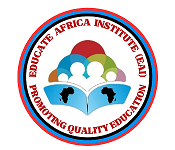GES Needs a Decade to Incorporate AI in School Education – William Boadi, Educate Africa Institute (EAI)
This analysis is presented by the Educate Africa Institute (EAI) a think tank dedicated to education reform, policy advocacy, and social justice in Ghana. As the world moves rapidly toward technology-driven solutions in education, EAI sees Artificial Intelligence (AI) as a vital component of 21st-century teaching and learning.
Artificial Intelligence refers to computer systems that simulate human intelligence such as learning, reasoning, and decision-making. In the context of school education, AI can personalize learning, enhance teaching tools, automate administrative tasks, and improve access to quality education, especially in underserved areas.
This report assesses the readiness of the Ghana Education Service (GES) to adopt AI in Ghanaian schools and estimates how long it might take to achieve nationwide integration.
Key Areas of Analysis
1. Infrastructure and Technological Readiness
Current Status:
Many public schools, particularly in rural Ghana, lack the basic infrastructure computers, internet, and electricity that are foundational for AI adoption. Urban and model schools are better equipped but still below the level required for AI.
Implication:
Without reliable digital access, the implementation of AI tools is not feasible.
Conclusion:
GES is not infrastructure-ready for AI integration.
2. Policy and Strategic Framework
Current Status:
There is currently no national policy or strategic framework aimed specifically at incorporating AI in education. Existing efforts, like coding programs and laptop distributions, are preliminary steps.
Implication:
The absence of a policy roadmap limits strategic action.
Conclusion:
GES lacks an AI-in-education policy direction.
3. Teacher Preparedness and Capacity
Current Status:
Most teachers have not been trained in AI concepts or tools. Professional development focuses more on general digital literacy.
Implication:
Teachers must be trained or retrained in AI to be effective facilitators.
Conclusion:
Teacher readiness is low.
4. Curriculum Integration
Current Status:
AI is not part of the current national curriculum. While STEM education is growing, AI content is still absent.
Implication:
Students lack exposure to foundational AI knowledge and skills.
Conclusion:
AI is not integrated into Ghana’s formal curriculum.
5. Stakeholder Engagement and Collaboration
Current Status:
GES has limited engagement with AI-focused companies, NGOs, or international partners. Some pilot innovations exist, but without scale or coordination.
Implication:
Collaboration is key for AI adoption, and the current ecosystem is too weak.
Conclusion:
Stakeholder support is insufficient.
6. Funding and Investment
Current Status:
The education sector remains underfunded, with limited room for emerging technologies like AI.
Implication:
Substantial investments are needed for AI infrastructure, training, and maintenance.
Conclusion:
Financial limitations delay AI adoption.
Summary: Is GES Ready to Utilize AI in Schools?

Based on current indicators, the Ghana Education Service is not yet ready to incorporate AI across public schools. However, with deliberate planning and stakeholder support, this can change over time.
Recommendations from EAI
1. Develop a National AI-in-Education Policy with timelines and measurable goals.
2. Invest in Digital Infrastructure in underserved districts.
3. Train Teachers in AI literacy and classroom integration.
4. Build Partnerships with tech companies, academia, and NGOs.
5. Launch Pilot Projects in selected schools and expand based on lessons learned.
Estimated Timeline (2025–2035)
A realistic, phased roadmap could look like this:
Phase 1: Foundation Building (2025–2028)
Draft national AI-in-education policy.
Begin infrastructure upgrades.
Launch teacher training in AI.
Initiate pilot programs in selected urban schools.
Phase 2: Pilot and Curriculum Integration (2028–2032)
Introduce AI topics in the school curriculum.
Expand AI tools in model schools.
Begin nationwide teacher certification in AI.
Establish monitoring and evaluation systems.
Phase 3: Nationwide Implementation (2032–2035)
Roll out AI integration across rural and public schools.
Adapt AI tools to local languages and context.
Set up AI Education Innovation Centers.
Key Dependencies
Strong political will and policy continuity.
Dedicated funding from government and international donors.
Private sector and community collaboration.
Accelerated teacher training and infrastructure development.
Conclusion
With the right planning and partnerships, Ghana could begin meaningful AI integration in schools within the next 5 years. However, a complete, nationwide rollout may take up to a decade.
The Educate Africa Institute (EAI) is ready to collaborate with the Ministry of Education and Ghana Education Service to lead the way in preparing Ghanaian schools for the AI revolution.
Signed,
William Boadi
Executive Director, Educate Africa Institute (EAI)
Educationist, Political Analyst, and Social Worker
Contact: 0541935106
EAI: Education and Social Justice



